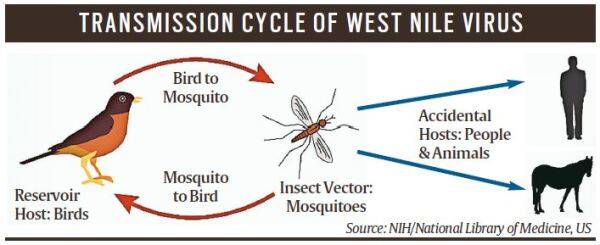The West Nile virus, a mosquito-borne illness, has emerged as a significant public health concern in recent years. While many people are aware of its existence, the symptoms and severity of this viral infection often remain underestimated. In this article, we will delve into the world of West Nile virus, shed light on its symptoms, and explore the potential dangers it poses to human health.
The Silent Threat: Unmasking West Nile Virus Symptoms

The West Nile virus is primarily transmitted to humans through the bite of infected mosquitoes, specifically the Culex species. It was first identified in the West Nile region of Uganda in 1937 and has since spread to different parts of the world, including North America, Europe, and Asia. Although most individuals infected with the virus experience mild or no symptoms at all, some can develop severe complications.
The Incubation Period:
After being bitten by an infected mosquito, it typically takes anywhere from 2 to 14 days for symptoms to appear. This period is known as the incubation period. However, it is important to note that not everyone infected with the West Nile virus will show symptoms, making it challenging to detect and control its spread.
Also read : The Impact of Climate Change on mosquito-borne diseases in Kern County
Mild Symptoms:
The majority of individuals infected with the West Nile virus will experience mild symptoms, often mistaken for flu or common cold. These can include fever, headache, body aches, fatigue, and occasionally, a rash. Many people recover from these symptoms within a few days or weeks without any long-term complications.
Severe Symptoms:
While most cases of West Nile virus remain mild, a small percentage of individuals can develop severe symptoms that affect the central nervous system. These severe cases, known as neuroinvasive disease, can lead to potentially life-threatening conditions such as meningitis, encephalitis, or acute flaccid paralysis. Symptoms of neuroinvasive disease include high fever, severe headache, neck stiffness, disorientation, muscle weakness, seizures, and even coma.
Vulnerable Populations:
Certain groups of people are at a higher risk of developing severe symptoms when infected with the West Nile virus. The elderly, individuals with weakened immune systems, and those with underlying medical conditions such as diabetes, cancer, or kidney disease are particularly vulnerable. Pregnant women and their unborn babies may also face increased risks.
Diagnosis and Treatment:
Diagnosing West Nile virus can be challenging, as its symptoms often resemble other viral infections. Blood tests can help confirm the presence of the virus, and in severe cases, a lumbar puncture may be necessary to analyze cerebrospinal fluid. Unfortunately, there is no specific treatment for West Nile virus, and medical care usually focuses on alleviating symptoms and providing supportive care.
Prevention and Control:
Prevention is key in combating the spread of West Nile virus. Measures such as using mosquito repellents, wearing protective clothing, and eliminating standing water where mosquitoes breed can significantly reduce the risk of infection. Community-level initiatives, such as mosquito control programs and public health education, are also vital in preventing outbreaks.
The West Nile virus may be considered a silent threat due to its ability to hide behind mild symptoms or even go unnoticed in many cases. It is crucial to raise awareness about the virus, its symptoms, and potential complications to ensure early detection and appropriate medical care. By understanding the risks and taking preventative measures, we can minimize the impact of the West Nile virus and protect ourselves and our communities from its grasp.
Must read: Do Possums Have Rabies? Understanding the Facts and Risks
6 Major Health Benefits of Consuming Honey-Coated Dried Fruits










Leave a Reply